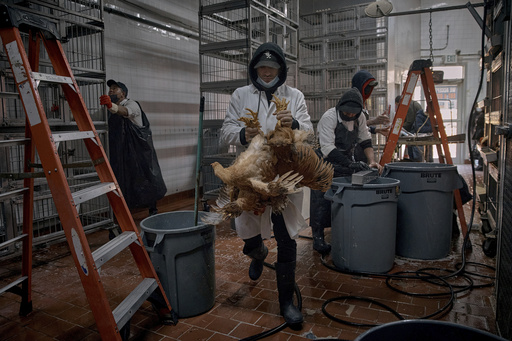NEW YORK — On Friday, live poultry markets across New York City moved quickly to sell off their chickens and other birds following the identification of seven avian flu cases. State authorities mandated a temporary week-long closure of these markets in the metropolitan area as a precautionary measure. Governor Kathy Hochul assured the public that there was no immediate risk to public health, emphasizing that this decision was made from an abundance of caution. The avian flu has caused significant disruptions in poultry farms nationwide, resulting in the culling of millions of birds and rising egg prices, although health officials have confirmed that no human cases have been reported in New York.
The state directive followed the discovery of infected birds during routine inspections at live bird markets located in the Bronx, Brooklyn, and Queens. The order requires these markets to eliminate all poultry, handling the disposal in a sanitary manner. Markets that have not reported any cases must quickly sell off their remaining birds within three days, undertake thorough cleaning and disinfection, and remain closed for a minimum of five days until state officials can verify they are safe to reopen.
At La Granja, a halal poultry market in Harlem, employees were in a rush to clear their stock, which included around 200 live chickens of various breeds, as well as turkeys, quail, ducks, roosters, and pigeons. Owner Jose Fernandez indicated that any unsold animals would be processed and given away to staff and loyal customers. “We’re going to lose money for now,” he remarked, acknowledging the situation. “But the law is the law. They know what they’re doing.”
The Centers for Disease Control and Prevention (CDC) has reported that the risk of the virus to the general public remains low. In the U.S., 67 confirmed human cases of bird flu have been documented, mostly among farmworkers who came into contact with sick poultry or dairy animals, with the illnesses being mild in nature.
Despite these concerns, New York City’s poultry markets seemed to maintain a steady flow of customers. At the Wallabout Poultry market in Brooklyn, patrons were seen taking numbers and selecting their chickens, which employees retrieved from crowded cages, weighed, and then took for slaughter. “I’m not worried about any bird flu,” stated Stan Tara, a 42-year-old Brooklyn resident, while he purchased a large chicken for $22.50. “It’s the same as you buy from the supermarket. A little more expensive, but at least it’s fresh.”
The first human fatality due to bird flu in the U.S. was reported last month in Louisiana; the victim was over 65 years old, had pre-existing health conditions, and had interacted with sick and deceased birds from a backyard flock. The H5N1 strain of bird flu has been spreading among wild birds, poultry, and other animals, prompting health officials to recommend that anyone handling sick or dead birds use protective gear, including respiratory protection and gloves.
The avian flu outbreak has impacted more than 156 million birds in the United States, predominantly affecting large commercial farms that faced the difficult decision of culling their entire flocks. Amid these developments, some animal rights advocates have criticized the state’s decision to allow markets to continue sales instead of shutting them down entirely.
“The public is entering markets without knowing whether there are avian flu outbreaks, potentially taking home infected birds,” criticized Edita Birnkrant, executive director of NYCLASS, an organization concerned about conditions in live animal markets in the city. “It’s ludicrous.”
According to CoBank, a financial services provider for agriculture, U.S. egg prices are expected to remain elevated beyond Easter and into 2025, partly due to the avian flu crisis. The highly contagious virus has impacted nearly 100 million egg-laying hens since 2022. CoBank noted that alongside avian flu, other factors like soaring consumer demand for eggs and increased activity from rapidly expanding breakfast chains are adding to the supply crunch and price hikes.



